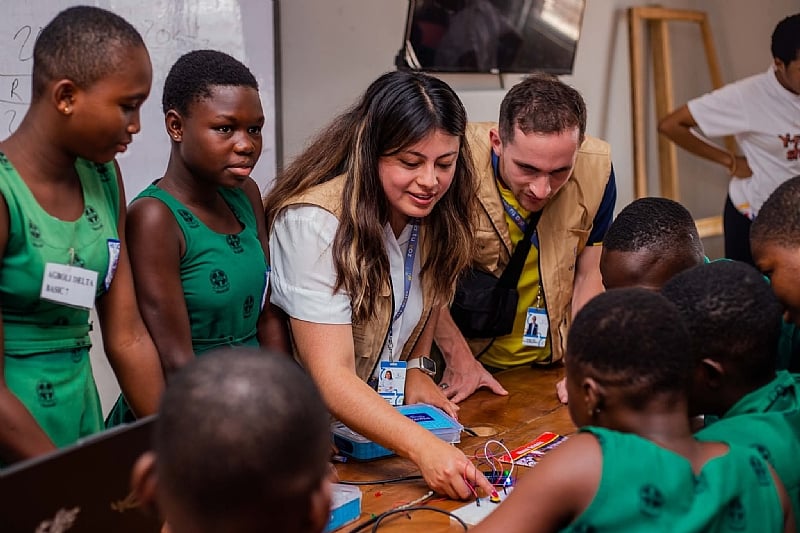The Young and Safe initiative, a project focused on youth development, recently held a STEM-focused boot camp at Ho Dome EP Basic School in Ghana, emphasizing the importance of nurturing children’s interest in Science, Technology, Engineering, and Mathematics (STEM) for future opportunities. Project Coordinator Joshua Tetteh Ayayi highlighted the transformative potential of STEM education, illustrating how it extends beyond academic performance to foster creativity and problem-solving skills. He cited the success story of Selassie Chiokulu, a former boot camp participant who progressed from a basic school robotics program to advanced learning opportunities at Ashesi University, underscoring the significant impact of early exposure and encouragement in STEM fields. The boot camp provided 30 students with hands-on experience in robotics and virtual reality, aiming to spark their interest in these areas and equip them for a technology-driven future.
Ayayi stressed the importance of parental support in fostering children’s STEM interests, urging parents to encourage exploration and curiosity. He envisions boot camp participants as STEM ambassadors, spreading their enthusiasm and knowledge to their peers. While acknowledging the project’s limited reach, he emphasized the ripple effect of inspiring even a small group of students who can then influence others. The Young and Safe Project’s core mission centers on creating inclusive cities for young people, addressing their health, well-being, employment prospects, safe spaces, and participation in governance. STEM education serves as a crucial tool within this framework, empowering young people in Ho and beyond with the skills and knowledge necessary for success in a rapidly evolving world. Since 2023, the project has conducted several robotics and virtual reality boot camps, strategically targeting different schools to broaden its impact.
The boot camps, according to Ayayi, contribute to building a culture of inquisitiveness and preparing learners for the challenges and opportunities of the digital age. The project, scheduled to run until 2026, benefits from the support of various partners, including the Ghana Education Service (GES – Ho Municipal Directorate), LoveAid Foundation, Node Eight, and the Ho Municipal Assembly. This collaborative approach strengthens the project’s reach and effectiveness, allowing it to tap into the expertise and resources of multiple organizations. At the national level, the project’s parent organization, Foundation Botnar, is collaborating with GES on the GSTEP program, which aims to develop a comprehensive STEM curriculum for basic schools. This initiative seeks to introduce junior high students to STEM concepts early in their education, laying the foundation for further studies in these fields.
Ayayi extended an invitation to private individuals and organizations to support the project beyond its current funding period. He emphasized the importance of scaling up the initiative across the Volta Region and Ghana to provide more children with essential skills for the future. Expanding the program’s reach would significantly enhance its potential to equip a larger cohort of students with the knowledge and capabilities needed to thrive in the 21st-century workforce. This broader impact would contribute to national development by fostering a generation of innovators and problem-solvers.
David Ikechi, Communications Officer for the Young and Safe Project, explained the pedagogical approach behind the boot camps, emphasizing the interactive and engaging nature of the learning experience. The use of robots and VR headsets aims to create an immersive environment that stimulates curiosity and encourages active participation. This hands-on approach allows students to explore STEM concepts in a dynamic and stimulating way, fostering a deeper understanding and appreciation for these subjects. Ikechi positioned the boot camp activities within a larger plan to transform education in the municipality, moving away from traditional rote learning methods towards a more active, inquiry-based approach. This transformation aims to cultivate a stronger desire for knowledge and a passion for lifelong learning among students.
The Ho Dome EP Bootcamp included the participation of Augustine Ansah Akrofi, In-Country Manager at Ecorys, and representatives from the Alza Tu Voz – Raise Your Voice team from Ecuador. This cross-cultural exchange provided a valuable opportunity for students to share ideas and perspectives with individuals from different backgrounds. The international collaboration enhanced the learning experience by exposing students to diverse approaches to problem-solving and innovation. The organizers underscored the vital role of early STEM exposure in national growth, emphasizing the need for young people to become not just consumers of technology but creators of solutions that drive economic development. This proactive approach to STEM education seeks to position Ghana as a leader in innovation and technology.
Finally, two participating students, Delight and Obed, shared their enthusiastic responses to the training. Delight, a JHS 2 student, expressed her newfound understanding of robotics and their potential to simplify everyday life, as well as the importance of maintaining these complex systems. Obed, also from the school, described his enjoyment of the VR sessions and the skills he gained in assembling robotic parts. Both students expressed their eagerness for more such sessions, recognizing the potential of the training to shape their future aspirations. Their testimonials highlight the effectiveness of the boot camp’s hands-on approach in sparking interest and fostering a desire for further learning in STEM fields.


